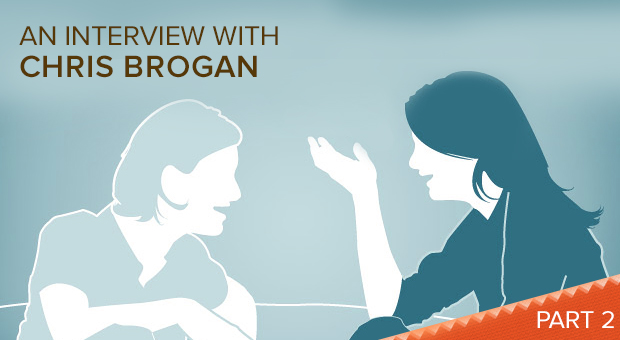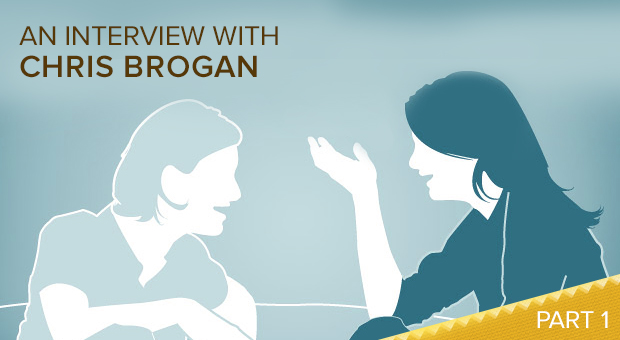What I am always trying to do is tie a mainstream, real world metric to these goofy online metrics because I just don’t care how many video views we got, or what our Klout is. What I say is “Did the cash register ring?” If the answer is yes, then we met our goal.
This is part 2 of our interview with author, blogger and social media expert Chris Brogan.
Over the last few years there has been a greater adoption of social media by companies looking to use social platforms to connect with consumers. Chris Brogan has been busy speaking, blogging and advising companies on how to do just that for the last 12 years as one of the biggest rock stars in the social media world.
Brogan is co-author of New York Times bestsellers The Impact Equation and Trust Agents, (both cowritten with Julien Smith) and author of Social Media 101 and Google Plus for Business. Both in his roles as CEO & President of Human Business Works, co-founder of the PodCamp new media conference series and as a blogger himself, Brogan has a long history of shaping the way that companies approach the social web. Flightpath took the opportunity to speak with Brogan about his take on how companies could better utilize social media, measure ROI and just do social better.
In your book, The Impact Equation you have an equation for success that includes platforms, ideas and so forth. What do you think companies are missing as part of the equation?
Brogan: The real hope of the book is letting people know how you get your idea to resonate with people in such a way that they take action. What Julien Smith and I who wrote the book together, found and believe is that everyone seems part of this figured out.
They might have a great idea, but not a big enough platform for anyone to see it. They might have an amazing idea and an amazing platform but they haven’t found a way to connect with people so that people can run with the idea.
I think that getting that whole set of chains to turn the same way and pull the same gear is what I am really working on the hardest.
Flightpath: How have you seen the social space change over the time you have been in it?
What has changed in 12 years is that we humans expect a much more custom, personalized humanized response in business. There was none of this in the 80’s and the 90’s. There was none of us going “Oh man, I didn’t hear back from someone specific at Delta, I got a form letter.” That is just how life was. I grew up with my family yelling at the TV, now everyone tweets at the TV. There are some vast differences, but I think it is all good stuff.
Flightpath: I’ve known you for a long time from podcasting, and think it’s interesting that you are launching a new podcast, The Human Business Way. Within all the forms of social media, podcasting is really the one that never blew up and went so mainstream. So, I think its interesting that you are investing in podcasting as a way to get your messaging out. Do you think that podcasting still has the promise it did in 2006?
Brogan: That is my favorite question so far. This is a really interesting time for this medium called podcasting. When we were at it, I didn’t get into it until like 2006 or 2005, but I know that you were in it before that even and that you have one of the longest running ones in the world.
When I got into this space, I was just like everyone else in that space thinking this is going to be great- we are going to topple TV stations and the radio and the world is gonna be ours and I am going to buy a bunch of stickers, because that seems to be what everyone did.
Then that collapsed because at the time no one had the technology you had to be like a PHD to figure out how to get the podcast onto whatever device. It was just so much work. Now we are in this world because I can record, edit and post from the my phone. The process is just much more streamlined now.
At the same time, podcasting suddenly picked up a lot of news from the strangest of ways. So first off, all the nerds came and made podcasts and life was good for all 3,000 listeners that we shared. Then, the mainstream discovered podcasting and all they used it for was archival distribution of their mainstream junk and that was boring, although it got more people to listen.
Now, these mainstream people who have said F you mainstream and they are becoming apart of this new thing like Kevin Smith and Adam Carolla and every other comic it seems has a podcast. They have brought new attention to podcasting people are seeing that they really can listen to whatever they want.
So, the reason I invested in it is because it is right out of the Impact Equation. It is Contrast, not everyone has this kind of a show. It’s Reach- putting me into a whole new place that I haven’t been, like iTunes. I got an email the other day from a listener saying “This is great do you have a website” and I thought “This is great, I have made it.”
Its one of these things where we think we shouldn’t be doing it, it’s not a great idea because is takes a lot of time. That is why I am gonna do it. I know it is a way to get more engagement with people.
Flightpath: So the last question is a question that every social media marketer who deals with companies is posed. It is “What is the ROI of social media?” Just how do you answer that question, or do you not- or is it a terrible question?
Brogan: I do it all the time, and I tell you what I do. I say that there is no blanket answer because what you really need to do is always this: you have to say that you are going to tie this activity, this effort, this event to a direct and obvious revenue stream
So for example, if I am helping a beer company sell more beer, then I would do it through Facebook and through the bars. I would choose very specific bars and I would create very targeted promotions for the bars and do all kinds of work to pump that up via the social web. Then I would ask the beer company how many more cases of beer did the bar order this week versus last week and that is the measurement.
What I am always trying to do is tie a mainstream, real world metric to these goofy online metrics because I just don’t care how many video views we got, or what our Klout is. What I say is “Did the cash register ring?” If the answer is yes, then we met our goal.
In ROI, the first question should always be “What is the I?” If you put no money in and you are wondering where the return is, then you are obviously not doing it right.
Second, if you are saying more what is the time involved to get a yield, then that is a harder question that is like asking how long does it take to grow a garden. To me, there are some different metrics to look at in that case. What I always look at specifically in ROI is a real world number that I can move with an online technology.
Read Part 1 of our interview with Chris Brogan here.

